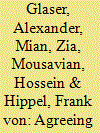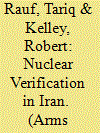|
|
|
Sort Order |
|
|
|
Items / Page
|
|
|
|
|
|
|
| Srl | Item |
| 1 |
ID:
132781


|
|
|
|
|
| Publication |
2014.
|
| Summary/Abstract |
Iran is negotiating with a group of six states over the future of its nuclear program. In November 2013, Iran and the P5+1 (China, France, Germany, Russia, the United Kingdom, and the United States) agreed to a Joint Plan of Action that seeks to reach a "comprehensive solution" by July 20, 2014.
The goal is an agreement on a set of measures that can provide reasonable assurance that Iran's nuclear program will be used only for peaceful purposes and enable the lifting of international sanctions imposed on Iran over the past decade because of proliferation concerns.
A key challenge is to reach agreement on limiting Iran's uranium-enrichment program, which is based on gas centrifuges, in a way that would enable Iran to meet what it sees as its future needs for low-enriched uranium (LEU) fuel for nuclear research and power reactors while forestalling the possibility that this program could be adapted to quickly produce highly enriched uranium at levels and in amounts suitable for use in nuclear weapons
|
|
|
|
|
|
|
|
|
|
|
|
|
|
|
|
| 2 |
ID:
134083


|
|
|
|
|
| Publication |
2014.
|
| Summary/Abstract |
For nearly a year, negotiations on Iran's nuclear program have been underway between Iran and the EU3+3 (China, France, Germany, Russia, the United Kingdom, and the United States).[1] The two sides in the negotiations, which the European Union has facilitated, are seeking a "mutually-agreed long-term comprehensive solution that would ensure Iran's nuclear programme will be exclusively peaceful."[2]
In November 2013, the sides agreed to an arrangement known as the Joint Plan of Action, under which Iran has taken substantial steps to address proliferation concerns about its nuclear activities. In particular, under International Atomic Energy Agency (IAEA) safeguards supplemented by additional IAEA monitoring and verification pursuant to the Joint Plan of Action, Iran has halted the production of uranium enriched to 20 percent uranium-235 and down-blended half its entire stock of that material to below 5 percent U-235 while converting the rest to uranium oxide, which cannot be immediately used for enrichment. In addition, Iran has capped the production of 5 percent-enriched uranium and accepted daily IAEA inspector access at its uranium-enrichment facilities at Natanz and Fordow and monthly access at the under-construction Arak heavy-water reactor, among other measures.[3]
|
|
|
|
|
|
|
|
|
|
|
|
|
|
|
|
|
|
|
|
|